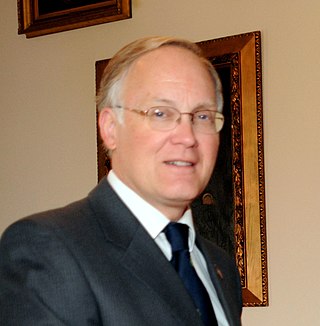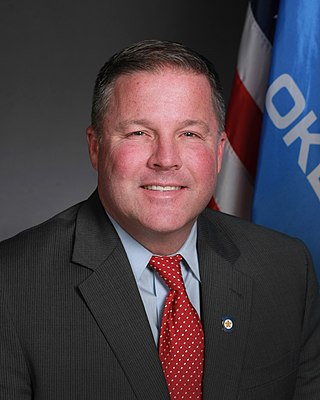External links
- Vermont Senate Biographies
- Legislative record of the appointment of Coppenrath as Julius Canns' successor
George R. Coppenrath was a Republican member of the Vermont State Senate, representing the Caledonia senate district.
George Coppenrath was appointed by Governor James Douglas to the Vermont State Senate on April 12, 2005 to serve out remainder of the term of Senator Julius D. Canns, who had died on February 20, 2005. On November 7, 2006, Coppenrath was elected to a full term in the state Senate.
Coppenrath served as Chief of the Town of Barnet fire department. He and his wife Sue have three sons, Ethan (age 30), Taylor (age 27), and Drew (age 23). Taylor Coppenrath is a professional basketball player.
Coppenrath was appointed to the Vermont Senate by Governor Jim Douglas on April 12, 2005 and won election in his own right in November 2006. He announced in early 2008 that he would not seek re-election to a second full term.

Warren Robinson Austin was an American politician and diplomat who served as United States Senator from Vermont and U.S. Ambassador to the United Nations.

The Vermont General Assembly is the legislative body of the state of Vermont, in the United States. The Legislature is formally known as the "General Assembly", but the style of "Legislature" is commonly used, including by the body itself. The General Assembly is a bicameral legislature, consisting of the 150-member Vermont House of Representatives and the 30-member Vermont Senate. Members of the House are elected by single and two-member districts. 68 districts choose one member, and 41 choose two, with the term of service being two years. The Senate includes 30 Senators, elected by seven single-member and nine multi-member districts with two or three members each. It is the only state legislative body in the United States in which a third party has had continuous representation and been consecutively elected alongside Democrats and Republicans.

James Holley Douglas is an American politician from the state of Vermont. A Republican, he served as the 80th governor of Vermont from 2003 to 2011. On August 27, 2009, Douglas announced that he would not seek re-election for a fifth term in 2010. He left the office in January 2011.

The governor of Oregon is the head of government of Oregon and serves as the commander-in-chief of the state's military forces. The title of governor was also applied to the office of Oregon's chief executive during the provisional and U.S. territorial governments.

George David Aiken was an American politician and horticulturist. A member of the Republican Party, he was the 64th governor of Vermont (1937–1941) before serving in the United States Senate for 34 years, from 1941 to 1975. At the time of his retirement, he was the most senior member of the Senate, a feat which would be repeated by his immediate successor Patrick Leahy.

The 2006 United States Senate election in Vermont was held November 7, 2006. Incumbent independent Senator Jim Jeffords decided to retire rather than seek reelection to a fourth term, and Bernie Sanders was elected to succeed him.

The Vermont House of Representatives is the lower house of the Vermont General Assembly, the state legislature of the U.S. state of Vermont. The House comprises 150 members, with each member representing around 4,100 citizens. Representatives are elected to a two-year term without term limits.

David E. Zuckerman is an American politician who served as the 84th lieutenant governor of Vermont from 2023 to 2025. He previously served two terms as the 82nd lieutenant governor of Vermont, from 2017 to 2021. A member of the Vermont Progressive Party, he previously served in the Vermont House of Representatives for seven terms (1997–2011), and the Vermont Senate for two (2013–2017). In 2020, Zuckerman was a candidate for governor of Vermont. He ran with the support of both the Progressive Party and the Democratic Party, but lost to incumbent governor Phil Scott in the general election.

Lee Earl Emerson was an American politician who served in both the Vermont House of Representatives and the Vermont Senate. A member of the Republican Party, he was the 63rd Lieutenant Governor of Vermont and the 69th governor of Vermont. When he was first elected in the 1950 Vermont gubernatorial election, he received over 70% of the vote, a feat not equaled until 1992 and not until 2022 by a Republican. Despite his success in 1950, he lost the Republican primary for U.S. Senate in Vermont in 1958 to Congressman Winston L. Prouty. He also lost the 1960 primary for Vermont's seat in the U.S. House of Representatives to incumbent Governor Robert T. Stafford.

The Vermont Senate is the upper house of the Vermont General Assembly, the state legislature of the U.S. state of Vermont. The senate consists of 30 members elected from multi-member districts. Each senator represents at least 20,300 citizens. Senators are elected to two-year terms and there is no limit to the number of terms that a senator may serve.
The following is a list of the persons who have served in the Vermont Senate during the 2005-2006 session:
Julius Daly Canns was a Republican member of the Vermont State Senate, 1993–2005. He represented the Caledonia County Senate District.

Martha Jane Beattie Kitchel is an American politician serving as a Democratic member of the Vermont State Senate, representing the Caledonia senate district since January 2005.
In U.S. politics, an independent Democrat is an individual who loosely identifies with the ideals of the Democratic Party but chooses not to be a formal member of the party or is denied the Democratic nomination in a caucus or primary election. Independent Democrat is not a political party. Several elected officials, including members of Congress, have identified as independent Democrats.
Diane B. Snelling is an American politician from Vermont who served as a Republican member of the Vermont Senate, representing Chittenden County. Snelling was first appointed to the Vermont State Senate in January 2002 by Governor Howard Dean to serve the remainder of her mother, Barbara Snelling's, term in office, after her mother retired from the Senate.

The president pro tempore of the Oklahoma Senate is the second-highest-ranking official of the Oklahoma Senate and the highest-ranking state senator. The Oklahoma Constitution designates the Lieutenant Governor of Oklahoma as the highest-ranking official, serving ex officio as President of the Senate, even though the lieutenant governor only votes in the case of a tie. During the lieutenant governor's absence, the president pro tempore presides over sessions. By longstanding custom, the lieutenant governor presides over sessions devoted to ceremonial purposes, while the bulk of the legislative management and political power is reserved for the president pro tempore, who is elected directly by the Oklahoma Senate.

Ebenezer J. Ormsbee was an American attorney and politician from Vermont. A Republican, he served as lieutenant governor from 1884 to 1886, and governor from 1886 to 1888.

George Whitman Hendee was a Vermont lawyer, banker, and politician who served as President of the Vermont State Senate, the 27th lieutenant governor, 32nd governor of Vermont, and a U.S. Representative.

The 1852–53 United States Senate elections were held on various dates in various states, coinciding with the 1852 presidential election. As these U.S. Senate elections were prior to the ratification of the Seventeenth Amendment in 1913, senators were chosen by state legislatures. Senators were elected over a wide range of time throughout 1852 and 1853, and a seat may have been filled months late or remained vacant due to legislative deadlock. In these elections, terms were up for the senators in Class 2.

Dustin Allard Degree is a politician from the city of St. Albans in the U.S. state of Vermont. A Republican, he represented St. Albans in the Vermont General Assembly during the 2011-2012 biennial session. Degree graduated from Bellows Free Academy, St. Albans in 2003, attended the Tilton School in 2004, and attended Norwich University and the University of Vermont. He worked in the office of Governor Jim Douglas.